Home » 2020
Yearly Archives: 2020
FOLIO@Duke Newsletter v. 2 no. 3
Honeysuckle Release
Honeysuckle was released to the public on December 1, 2020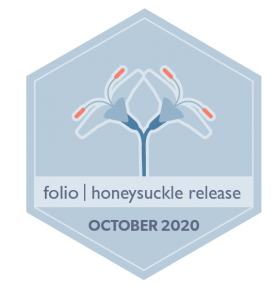 . Some new features include a circulation log, fast-add for Inventory records, a department field in the user record, and updates to Finance structure. Visit the Honeysuckle Release Notes for full details. We’ve requested that our development and test environments be upgraded to Honeysuckle in December and we’ll keep you posted on progress.
. Some new features include a circulation log, fast-add for Inventory records, a department field in the user record, and updates to Finance structure. Visit the Honeysuckle Release Notes for full details. We’ve requested that our development and test environments be upgraded to Honeysuckle in December and we’ll keep you posted on progress.
After the Honeysuckle release, the international project agreed to move to three releases per year, aiming for releases in March, July, and November. Iris will be the first release in 2021.
Local Project Updates
In November, the User Permissions Working Group sent out a survey to staff who supervise Aleph users. The supervisors were asked to submit one survey for each type of role they supervised. The survey included questions such as “What Aleph modules does this role use?”, “What functions are performed by this role in the Cataloging (or Acquisitions or Circulation} module?”, “Does this role use ARC or reports from ARC?”, and “Does this role run Aleph services?”. The User Permissions Working Group appreciates all the responses they received. They will review the results over the next two months and the survey will help to inform permission sets in FOLIO.
The Data Working Group reviewed and mapped information for loading existing orders into FOLIO and what information was needed to start loading loans. Active loans in FOLIO will need to use the new FOLIO circulation rules to be checked out to patrons during the migration, so a few of the most-used circulation rules have been configured as well to test the process. We’ve made great progress in our “data first” push to get large chunks of different data into our local FOLIO instance and have bibliographic/holdings/items, patrons, and organizations (vendors) loaded. Orders, loans and courses data have been mapped and are ready for the development team to code the migrations. We decided that we likely will not migrate budgets from Aleph, and DUL is going to take this opportunity to review our existing budget structure. Requests and Fees/Fines are left to be mapped for migration, but will need circulation policies in place first.
In the new year, we’ll kick off the creation of some basic training courses, and we’ll start a mini-project to implement the Courses module, with the intention of being able to use FOLIO Courses for the Duke Summer Sessions. We’ll also work on creating a budget structure for FOLIO, and continue work on circulation rules.
Watch This
On December 2, there was a FOLIO Forum held on the Open Library Foundation’s YouTube channel. This will be a panel discussion with Cheryl Malmborg, product owner for Circulation Rules and Policies, and a number of institutions who are using FOLIO in production will talk about and demo their rules.
There will be an open Q&A with the panel from the Circulation Rules Forum on December 7 at 8:00am Eastern. The Zoom meeting will require the universal FOLIO meeting password. Please contact any member of Library Systems and Integration Support if you would like that password.
Bee Facts
With the holiday baking season upon us, consider a recipe that highlights  honey! Perhaps Chewy Honey Oatmeal Cookies, Honey Brown Butter Blondies, or a Honey Apple Gingerbread Cake.
honey! Perhaps Chewy Honey Oatmeal Cookies, Honey Brown Butter Blondies, or a Honey Apple Gingerbread Cake.
FOLIO@Duke Newsletter v. 2 no. 2
Duke is using FOLIO apps in production!
As of July 7, Duke is using FOLIO apps in production! The ERM implementation team is using the Licences and Organization apps.

International Project Update
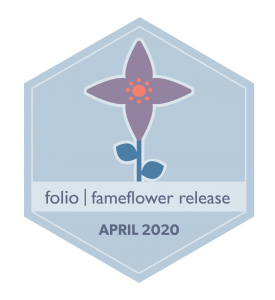
The international project released Fameflower in April. Some feature highlights include work for e-resources, licences and agreements, batch import and export updates for MARC data, work on the Courses app, and work on accessibility.
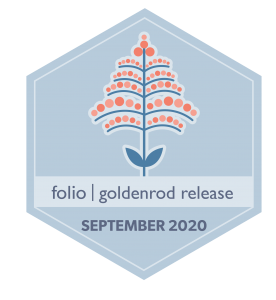
Goldenrod was released at the end of July. That release includes a new lightweight MARC editor app called QuickMARC, more features for the batch import and export, more features for resource and e-resource management, updates to patron notices and work to implement custom fields. We’ve been upgraded to Goldenrod on all three of our Duke instances, and are working to add the additional functionality into our data loads.
Local Project Update
Working Through a Pandemic
Throughout the pandemic this year, our Implementation Teams and our Working Groups have continued to meet and to move forward with work on FOLIO. We had already set up online meetings for all teams, use of the FOLIO Project wiki, and Box for shared documents, so a transition to working from home and meeting online was pretty smooth for our local project. The project members have made great strides on our local implementation, and I thank everyone for their hard work to keep this project going amidst all the extra work the pandemic has thrown at us.
Timeline for Q3 and Q4 2020
In May, the members of the local project worked through another ranking exercise to help the international project plan the rest of 2020. Once we reviewed with the plan for 2020, we took a step back and decided to delay Duke’s full implementation of FOLIO another year, aiming at Summer 2022.
We will spend the rest of 2020 working to get samples of all the different kinds of data into our test instance. The majority of our bibliographic, holdings, and item records have been loaded into the Inventory App and Source Record Storage on our test server. Loading of patron records from the Duke Identity Management feed is expected in September. Following that will be data for Finances (budget), Courses, Orders, Invoices, Loans and Requests.
Progress from the Implementation Teams and Working Groups
Working Groups
The Configurations Working Group led a pair of small groups. One focused on how we would like to map our Aleph locations (institution, sublibrary, collection) to the four levels that FOLIO offers (institution, campus, library, location). The other small group discussed FOLIO material types and loan types. In Aleph, our item statuses are labeled as a mix of loan periods and material types (3-hour, 7-days, bound periodicals, microform). The decisions for locations, material types, and loan types are very important because they affect how items are mapped during migration, as well as how loan policies may be written in the future.
The Data Working Group completed the mappings of bibs, holdings, and items from Aleph to FOLIO. They’ve also completed the mappings for patron records. This group is leading the data-first focus for the rest of 2020.
The Documentation and Training Working Group has also prepared a survey that will be sent to all library staff to determine how best to plan FOLIO training. We want training to be a success and for all staff to feel as comfortable as possible with their tasks when we go live with FOLIO.
The Permissions Working Group discussed how best to consider roles or permission sets for staff in FOLIO. They have prepared a survey that will be released to supervisors in late October.
The Reporting Working Group investigated a number of different software options to be a staff interface for the Library Data Platform. It is possible that there may be a reporting app included with FOLIO. That would have an effect on what the Reporting Working Group recommends.
The Testing Working Group investigated use of an application to help keep track of testing and test cases. Members also took part in the international project’s Bug Fest to test new releases.
The Workflows Working Group worked on creating a document template that will allow the Implementation Teams a standard format to record their input and output workflows.
Implementation Teams
The Electronic Resources Management (ERM) Implementation Team worked through a complete project on their own and implemented the Agreements and Organizations Apps in production in July! They are continuing to work on additional features and integrations.
The Metadata Management Team worked with the Data working group to complete the mapping of bib/hol/item records. There was a request from the international project to rank issues regarding Authority Records, which they completed. They are currently working on mapping the 9xx fields.
The Resource Access Team worked to review current reports they use and to document their reporting requirements and considered our current patron statuses for mapping and creation/consolidation of new patron groups.
The Resource Management Team worked is continuing with mapping of Aleph vendor records to the Organizations App. Moving to FOLIO will offer the opportunity to reconsider the current budget structure and codes and serious thought is being given to that topic.
Watch This
Folio Forum on the Library Data Platform
What’s new in Inventory and QuickMARC app demo
Bee Facts
Sir David Attenborough explains on the Smithsonian Channel’s YouTube channel how bees communicate where to find new flowers with the most nectar.
https://www.youtube.com/watch?v=LU_KD1enR3Q
Duke FOLIO Forum February 19 2020
On Wednesday, February 19, we held our quarterly Duke FOLIO Forum. This quarter, we presented about the Edelweiss release, the time lines for both the larger project and our local implementation, shared information from WOLFcon20, and Erin Nettifee gave a tour of the FOLIO Project site on the Duke Wiki.
International Project Update
Edelweiss was released on January 10. This release has added 89 new features, and thanks to the FOLIO Bug Fests, fixed a record number of bugs! We have about 10 staff on the list for testing in the FOLIO Bug Fests, and they’re
bringing the skills they’ve learned back to our local implementation project. Many thanks to our testers!

The international FOLIO project continues on with scheduling the remaining features that need to be added. The libraries that are planning to go live this summer with a sub-set of FOLIO applications have created lists of the minimum functionality required for them to go live. The product owners are working with the lists to match Jira issues to the functionality. The group of libraries and the functionality needed can be found on the Round II list. The list includes Duke’s adoption of the ERM functionality. There are lists being curated to account for the needs of the libraries going live in 2020 with the MVP, and those (including Duke) going live in 2021 with the full implementation. You can find those lists on the FOLIO wiki under the Implementers Group; Working Groups section.
Duke sent 11 representatives to WOLFcon20 hosted by Texas A&M. We reviewed the schedule ahead of time with the intention of getting to as many FOLIO sessions as possible. On top of the usual special interest group meetings, a company called Arkivum partnered with EBSCO, and gave a plenary session on their product, Perpetua. Perpetua is a digital preservation system, which uses the FOLIO codex to search and connect with repository software and special collections. The plan is to release that software as open source in the future. About 10 staff from Shanghai Public Libraries attended WOLFcon and spoke about their plans to create a circulation app based on the FOLIO architecture to be able to handle 100 million circulation transactions a year! The sheer size and number of libraries and borrowers that the Shanghai Public Library system handles is mind-boggling. A few of the Chinese representatives reached out to Duke staff to learn more about our implementation plans and requirements. An interesting addition to this WOLFcon was presentations about how institutions are actually interacting with FOLIO. Chalmers gave a presentation on their support structure for both local bugs and bugs that need to be reported back to the larger project. The Data Migration SIG representatives from Index Data, Chicago and Texas A&M presented on how they’re loading data and the issues they’re running into. And the Accessibility SIG demonstrated the progress they’re making on ensuring FOLIO meets Web Content Accessiblity Guidelines 2.1 AA and has VPAT certification. WOLFcon21 will be held in Hamburg, Germany.
Local Project Update
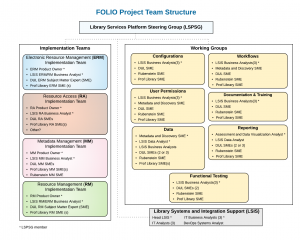
The LSP Steering Group held a kickoff meeting on January 8 for our local working teams to meet, learn about their roles on the teams, and more specifics on how the teams will work together.
Our local instance, hosted by Index Data, is up and the local project team members have access to it. At the moment, there’s minimal configuration and no data. We’ll be working with Index Data to get our Aleph data imported. They’ll also be available to help the project teams with implementation support and custom development. Index Data is also supporting FOLIO implementations for the University of Chicago, Lehigh University, and the Fenway Library Organization (FLO). We’ve already scheduled a standing meeting with Index Data and the other institutions they’re supporting so we can share local updates, work on common issues, and learn from each other.
Our local timelines are becoming more concrete as our local teams have started meeting. The ERM Implementation Team will be meeting with the Configurations Working Group in March to go over the configurations needed for the Licences app, and possibly the Agreements and eUsage apps. They’ll need to work with the User Permissions and Workflow Working Groups in early Spring to set up and test permission sets, and to understand the local workflows. Also this spring, the Configurations Working Group and the Data Working Group will be hosting a series of meetings to discuss how Duke will implement FOLIO’s four-level location hierarchy.
Finally, Erin showed us around the FOLIO project node on the Duke Wiki. Duke Staff will need to log in to see everything, as it’s not all open to the public.
We look forward to seeing you at the next Forum! Date and time coming soon.
Slide deck: Duke FOLIO Forum 2020219, Speaker notes
FOLIO@Duke Newsletter v. 2 no. 1

In this issue:
Duke FOLIO Forum Date and Time
Steering Group Update
Watch This
Bee Facts
Save The Date – Upcoming FOLIO Forum
Duke FOLIO Forum
February 19, 2020
10:00 a.m. – 11:30 a.m
Korman Assembly Room (Perkins 217)
Steering Group Update
On January 8, we gathered about 60 library staff who will be serving on the teams as we implement FOLIO here at Duke. We viewed a slide deck talking about the implementation timelines (ERM and the full implementation), reviewed the roles people will fill on the teams, and some basic team behaviors and norms. The larger group then broke into teams to schedule their first meeting and to review the team charters. Some teams even had time to do some brainstorming on tasks the teams should complete (for example, a glossary of terms). Members of the Duke University Libraries Executive Group attended as well to show support for the project. Teams will keep minutes from their meetings on the FOLIO project wiki. Duke staff, make sure you log in!
From January 22-24, eleven staff members of the Duke University Libraries and the David M. Rubenstein Rare Books and Manuscripts Library attended WOLFcon at Texas A&M University. WOLFcon is a gathering for members of the Open Library Foundation (OLF) and the open source software communities that are a part of OLF, including VuFind, ReShare, Coral, GOKb, and FOLIO. Local staff attended meetings regarding all parts of FOLIO, from the apps for functional areas (check-out, organizations, inventory, etc.), to discussions leaning more toward the technical (data loading, performance, accessibility, etc.).
Watch This
WOLFcon Plenary, Day One – January 22, 2020
Learn some history about Texas A&M University, and hear from David H. Carlson,
Dean of University Libraries
Bee Facts
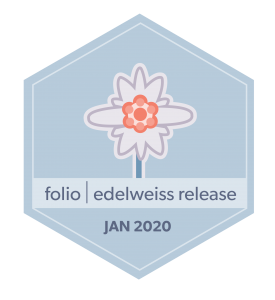
More about Edelweiss, the flower for which the most recent version of FOLIO was named.